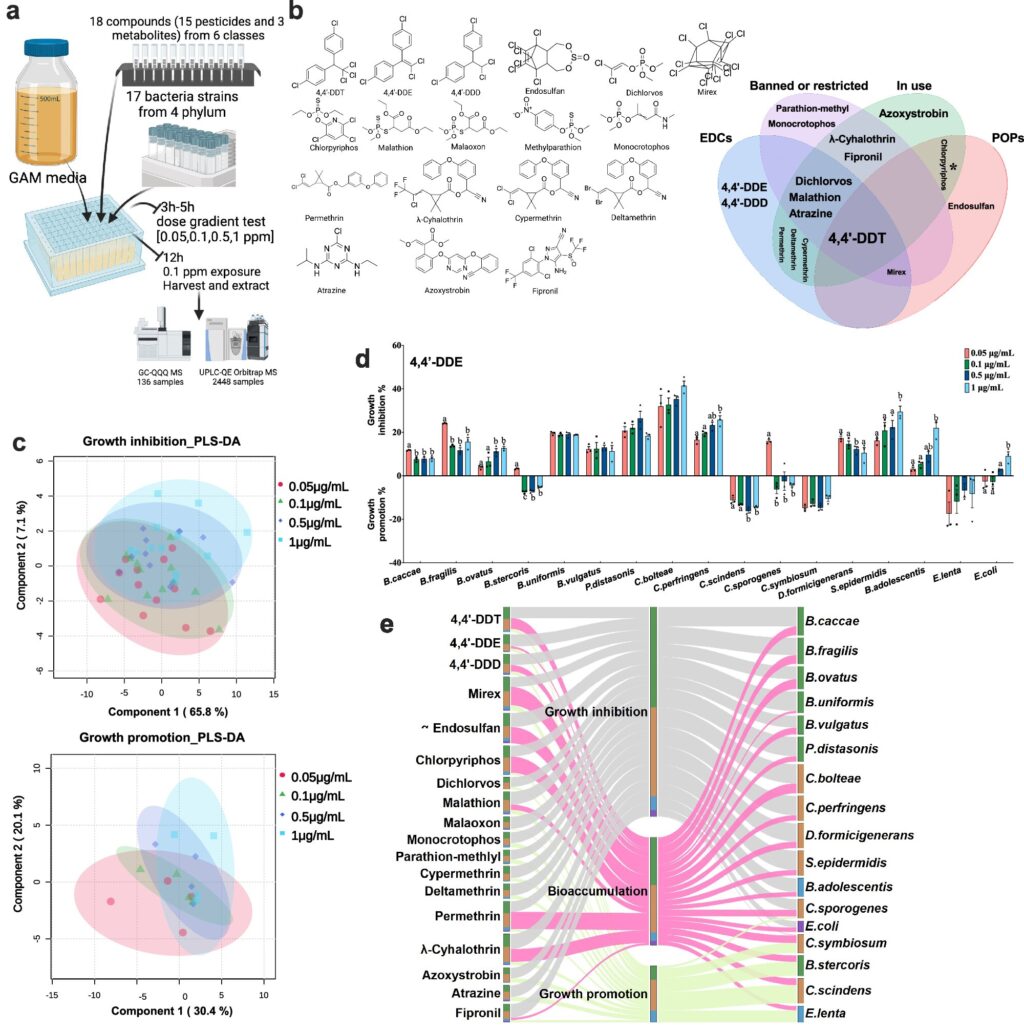
A groundbreaking study has unveiled a detailed atlas mapping how pesticides affect gut bacteria, potentially paving the way for probiotic interventions. Conducted by researchers at The Ohio State University, the study reveals that over a dozen pesticides influence the growth and nutrient processing of gut microorganisms. These findings, published in Nature Communications, offer new insights into the molecular mechanisms at play and suggest possible therapeutic strategies.
The research highlights the accumulation of pesticides in gut bacteria without altering them, a phenomenon observed both in laboratory settings and animal models. This comprehensive analysis is the first of its kind to map changes to specific gut bacteria based on interactions with insect-killing chemicals.
Understanding the Impact of Pesticides on Gut Microbes
According to the study, the atlas of molecular mechanisms is a valuable resource for targeted research on diseases and potential treatments. Experiments in mice revealed that certain gut bacteria species could mitigate pesticide toxicity, hinting at the possibility of developing probiotics to combat inflammation and other health issues caused by these chemicals.
“We’ve provided further understanding of how pesticides or environmental pollutants impact human health by modulating an important collection of microorganisms,” stated Jiangjiang Zhu, the study’s senior author and an associate professor at The Ohio State University. Zhu also noted the identification of microbes capable of degrading or removing pesticides, which could serve as future therapeutics to clear toxicity from the gut.
Mapping Pesticide-Bacteria Interactions
The study examined interactions between 18 pesticide compounds and 17 species from four major bacterial domains in the human gut. These pesticides, including DDT, atrazine, permethrin, and chlorpyrifos, are widely used in agriculture, though some, like DDT, are banned in certain countries. Despite restrictions, residues from legacy pesticides persist in soil and water.
Li Chen, the study’s first author, explained that they exposed bacteria cultures to relevant pesticide concentrations to observe microbial responses. The resulting bacteria-pesticide interaction network details which pesticides promote or inhibit bacterial growth and which bacteria absorb pesticide chemicals, potentially prolonging exposure within the body.
Network interaction analyses indicate that pesticide exposure led to changes in metabolites across gut microbiota.
Implications for Human Health
Most previous studies focused on the overall composition of gut bacteria, but this research delves into specific changes. The analysis identified 306 pesticide-gut microbe pairs, examining how altered growth patterns and chemical accumulation affect metabolites. These molecular products are crucial for energy production and other essential functions.
Additionally, the study explored the effects of pesticide exposure in mice. After clearing their digestive systems with antibiotics, researchers introduced Bacteroides ovatus to one group and compared them to controls. Results confirmed that pesticides cause inflammation in multiple organs, while the introduced bacteria influenced metabolic activity and lipid production, affecting oxidative stress pathways.
Future Directions and Research Opportunities
Zhu’s lab plans to further investigate how metabolic changes in gut microbes relate to health and disease conditions post-pesticide exposure. He anticipates that other scientists will build on these findings to explore disease research and intervention strategies.
“We are mapping out this central interaction between pesticides and gut microbes,” Zhu said. “Other labs can leverage our discoveries to predict targets or identify intervention strategies after pesticide exposure.”
The study’s co-authors include experts from Ohio State, Yale University, Zhejiang Academy in China, and Johns Hopkins University. Their collaborative effort has opened new avenues for understanding and mitigating the health impacts of pesticide exposure.
For more information, refer to the study by Li Chen et al., “Mapping pesticide-induced metabolic alterations in human gut bacteria,” published in Nature Communications.







